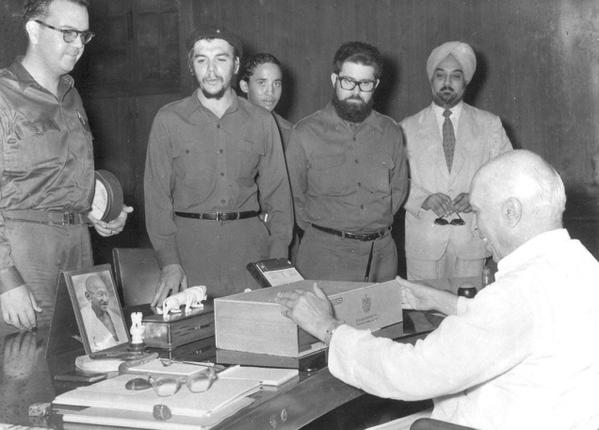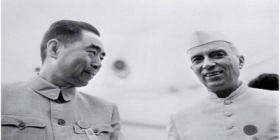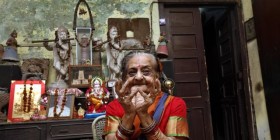In Pic :Nehru smiles as Che Guevara gifts him a box of Cuban cigars.
Despite his own convictions, Che Guevara understood India’s non-violent resistance as arising from a cultural context in which war was distant from the spirit of the people
Jean-Paul Sartre was impressed enough by Ernesto Che Guevara (1928-1967) to call him “the most complete human being of our age” after Che’s death. It was a reference to the Renaissance man, who Sartre exhorted for possessing fraternal as well as revolutionary ideals. Che, the Marxist revolutionary from Argentina, who became the major figure of the Cuban Revolution, had also spoken of “the New Man”, who would be a gender-blind, anti-imperialist, selfless worker of the people. He contrasted this to the American penchant for producing the “safe subject”, who is geared towards ushering “the revolution of the toilets”.
Che battled hard to restore his social and political optimism by upturning America’s hegemony in Cuba. Soon after the revolution was successful, Fidel Castro sent Che as an emissary to a number of countries including India. In this 45th year of Che’s death, which occurred on the October 9, I give here a recollection of Che’s visit to India in 1959, dwelling briefly on his interest in Nehru, noting his remarks on India and more emphatically, drawing out the significance of his brief comments on Gandhi.
Che and his delegation met Nehru in his office in New Delhi. Che later said Nehru met them with the “amiable familiarity of a patriarchal grandfather”. That comment on Nehru’s demeanour perhaps bordered on sarcasm. However, Che is said to have had an admiration for Nehru. Jon Lee Anderson wrote in his book Che Guevara: A Revolutionary Life that Che read The Discovery of India with interest, “underlining and scribbling comments about passages he found thought-provoking”. Anderson unfortunately did not furnish us with those passages. But it is possible to imagine Che being impressed by Nehru’s zeal for industrialisation within a socialist mode of state-controlled productivity. In his recorded impressions of India, Che had approvingly observed that India “had to be industrialised as a base for future economic development”.
PICTURE OF CONTRAST
But Che contrasted these welcoming signs with “the most abject misery”, which he observed during his visit to Calcutta. It opened his eyes to India’s stark social inequalities. In his impressions, Che began by comparing India’s soil with the soil of Egypt — which he had recently visited — finding India’s soil superior to that of the desert country. However, he proceeded to point out that “social injustice has resulted in an arbitrary distribution of land where a few have a lot and many have nothing”.
Though Che put the problem of economic disparities on record, he subtly avoided being judgemental about Nehruvian India. Che’s overall tone was optimistic rather than harsh. He was probably following Fidel Castro’s directives to get friendly with countries close to the socialist bloc. Che also offered to help the “brother people” of Kashmir when an earthquake struck the place near the end of his two-week visit. Even though it was about a non-political event, Che’s desire to help Kashmir and his use of the endearing phrase “brother people” evoke a sense of comradeship in the thick of calamity.
Perhaps the most significant remark Che made in his impressions was this: “In India, the word war is so distant from the spirit of the people that they did not use it even in the tensest moments of their struggle for independence.” This observation can serve to illuminate Che’s admiration for Gandhi’s method of resistance that was largely responsible for India’s non-militaristic struggle during the anti-colonial movement. Che called Gandhi a “mystic figure” but did not elaborate on that description. In an interview on All India Radio to journalist K.P. Bhanumathy, Che said, “You have Gandhi and an old philosophical heritage; in our Latin America we have neither. That is why our mindset has developed differently.” The mindset of politics, in Che’s inference, depends on the presence or absence of an old culture of thought. By that statement, Che endorses the crucial importance of a tradition of contemplation prior to modernity. Che perhaps also implied that without such a tradition, a figure like Gandhi was impossible. For it was Gandhi alone who had challenged the ideology of modernity and churned out a political response against it.
OF MERIT
Even as Che asserted to Bhanumathy that the “practical revolutionary initiates his own struggle simply fulfilling laws foreseen by Marx”, he conceded that Gandhi’s struggle had merit. For a man following the laws of revolution, Che’s estimation of Gandhi reveals his broadmindedness about political practices coming from a different historical context as well as his recognition of ideas resistant to the violence of history.
In his interview at AIR, Che had to face an awkward moment when Bhanumathy told him, “communist dogmas won’t be accepted by a multi-religious society”. In the face of this provocation, Che avoided calling himself a communist and asserted instead that he was a socialist who believed in equality and freedom from exploitation. But he drove a fundamental point home, saying, “The struggle for freedom starts from the hunger of the people.”
If Gandhi’s struggle stemmed from a critique of violence, Che’s ideology was an attack against a system that instilled violence by violating the basic necessities of people. For Che, hunger is a violent condition forced upon the hungry, and he finds violence an unavoidable method to counter that condition. For Gandhi, violence is a boomerang, which, once unleashed against the oppressor, would return to chase the oppressed. Despite Che’s close ties to violence, his endorsement of Gandhi’s non-violent struggle as a historical possibility is food enough for revolutionary thought.
(Manash Bhattacharjee is a political scientist and writer.)






Leave a reply